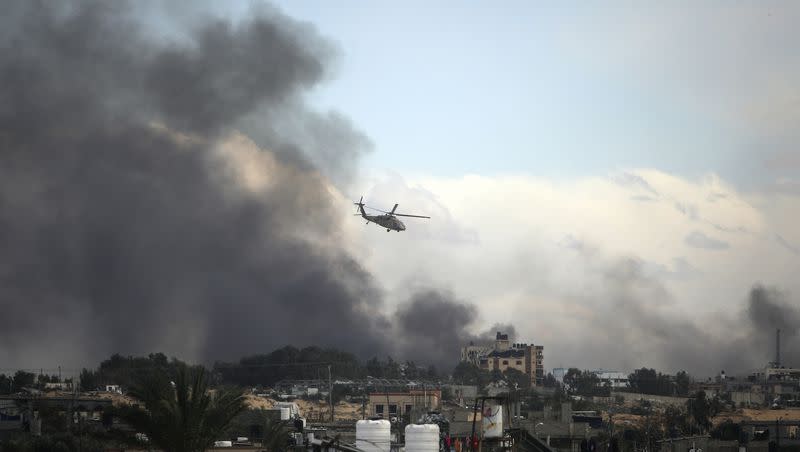Opinion: You can love Israel and still hold its government accountable

The devastation of what is happening in the Middle East is chilling. The Oct. 7, 2023, terrorist attack on Israel by Hamas was reprehensible. But the retaliatory response by the Israel Defense Forces, or IDF, has been excessive. Like Hamas, the IDF is guilty of war crimes — and it is not antisemitic to acknowledge this. In fact, many Jewish scholars, activists and organizations, including Jewish Voice for Peace, IfNotNow and J Street, are actively criticizing the Israeli government’s disproportionate response and are calling for a cease-fire, as is the Israeli/Palestinian group, Women Wage Peace.
The International Holocaust Remembrance Alliance has adopted the following working definition of antisemitism: “Antisemitism is a certain perception of Jews, which may be expressed as hatred toward Jews.” Criticism of specific actions of the Israeli government which are in violation of international law and qualify as war crimes can in no way be regarded as antisemitic.
There are perpetrators and there are victims in the current conflict. The perpetrators are neither the Jewish people nor the Palestinian people. They are the victims. The perpetrators are Hamas and the Israeli government. It is imperative that we be intellectually mature enough to hold this distinction in our minds.
The attack by Hamas on Oct. 7 was evil and wrong. Here are some well-documented facts:
This attack was the third largest terrorist attack since this type of data collection began over 50 years ago.
240 people were taken as hostages.
Hamas has been accused of using children as soldiers.
There is also evidence of horrific sexual violence perpetrated by Hamas.
Regardless of whether Hamas is considered a government or a terrorist group, and even if it sees itself as justly fighting against Israeli occupation, it must adhere to international law. Both Human Rights Watch and the Office of the United Nations High Commissioner for Human Rights have declared that Hamas’ indiscriminate attacks, taking of hostages and using human shields were in violation of international law and constitute war crimes.
As horrifying and inexcusable as this attack was, the Israeli government’s response has been disproportionate and ruthless, and the continued bludgeoning of Gaza and the systematic starvation of an entire people has led U.N. Secretary-General António Guterres to declare that Israel’s retaliation has caused “colossal human suffering.”
Related
Here are some documented facts:
As of this month, Israel’s counterattacks have killed 27,748 people, over 10,000 of these children. Read that again. Over 10,000 innocent children killed.
More than 120 journalists have been killed in Gaza.
Over 150 U.N. employees have been killed, the highest number in any conflict in U.N. history.
1.7 million people in Gaza have been internally displaced and 2.2 million people are at risk of starvation.
60% of Gaza housing structures have been destroyed or damaged and 90% of all schools in Gaza have been significantly damaged.
In the first week after the attack by Hamas, the IDF carried out 6,000 indiscriminate airstrikes, which hit markets, mosques, hospitals, schools and neighborhoods.
In just the first month after Oct. 7, over 100 significant cultural, religious, historical and/or archeological sites in Gaza were destroyed by the IDF.
The Israeli army’s prolonged blockade on food, fuel, water and electricity constitutes “collective punishment” — a war crime prohibited by Common Article 3 of the Geneva Conventions.
The IDF has repeatedly broken medical neutrality, also a war crime under the Geneva Conventions, by intentionally striking hospitals, ambulances and other health facilities.
There is also video evidence of what the Euro-Mediterranean Human Rights Monitor describes as “flagrant violation of international laws related to the protection of civilians” by Israeli soldiers. Soldiers are seen beating and trampling civilian detainees who are naked and have both arms and feet tied together.
These crimes are completely indefensible. And yet many of the world’s leaders are looking the other way. One can be an ally of Israel and still hold its leaders accountable. One can see Hamas as a terrorist organization and believe that Israel has a right to defend itself without condoning unethical, immoral or criminal actions.
The conflict in the Holy Land spans centuries and generations, and immediate solutions are unlikely. Both the Jews and the Palestinians have a long history of being displaced and persecuted. In this situation, declaring oneself pro-Israel or pro-Palestine is mostly unhelpful.
Any hope for peace in that region will require many more of us with some distance from the conflict to speak out with empathy and boldness against hatred, violence, war crimes and genocide wherever these atrocities are found on both sides, putting aside our fears of being labeled antisemitic or anti-Palestinian. Deep human suffering on both sides has created an empathy gap that is clouding judgment and threatening mutual destruction.
We must help bridge that gap by holding leaders, organizations and governments accountable, by repeatedly drawing attention to the human cost of this endless conflict and by rigorously rejecting politicians and ideologies that would sacrifice entire peoples to protect the political boundaries that should exist to serve and preserve, not destroy, human life.
Sharlee Mullins Glenn founded Mormon Women for Ethical Government in January 2017 and served as its executive director until 2019. She currently sits on the external advisory board of Brigham Young University’s Office of Civic Engagement and volunteers for a number of civic and humanitarian organizations. Her views are her own.

